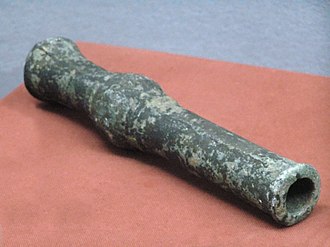Gun
Gun is a ranged weapon designed to use a shooting tube (gun barrel) to launch typically solid projectiles, but can also project pressurized liquid (e.g., water guns/cannons and projected water disruptors) or charged particles (e.g., plasma guns). Guns vary widely in size, ranging from large cannons and howitzers designed for warfare to small handguns and rifles for personal protection and hunting. The projectile is propelled by the rapid expansion of gases produced by a sudden chemical reaction, usually the ignition of gunpowder. This process is known as deflagration.
History
The history of guns dates back to 12th-century China, where the earliest gunpowder-powered weapons were developed. By the late 13th century, these weapons had spread to the Islamic world and Europe, where they were further refined and developed into various forms, including cannons and muskets. The invention of the gun has been a pivotal moment in military history, altering the way wars were fought and leading to significant changes in tactics and fortifications.
Types of Guns
Guns can be broadly classified into three main categories: handguns, rifles, and shotguns.
- Handguns are designed for use with a single hand and include revolvers and pistols. They are primarily used for personal defense and law enforcement.
- Rifles are long-barreled guns designed for precise shooting, with grooves (rifling) inside the barrel that impart a spin to the bullet, stabilizing it and improving accuracy over long distances. They are commonly used in hunting, sports shooting, and military applications.
- Shotguns are designed to fire a large number of small projectiles (shot) or a single projectile (slug) and are used primarily for hunting birds and other small game, in sports shooting, and for law enforcement.
Operation
The basic principle of gun operation involves the firing mechanism triggering the primer, which ignites the gunpowder contained within the cartridge. The rapid expansion of gases from the burning gunpowder increases the pressure inside the barrel, propelling the bullet or projectile out of the barrel at high speed.
Safety and Regulation
The use of guns is subject to extensive regulation and control, aimed at preventing accidental injuries and criminal activities. Laws vary significantly between countries, with some requiring strict licensing and registration of firearms, while others have more lenient regulations. Gun safety practices and education are critical to preventing accidental shootings and ensuring the responsible use of firearms.
Impact
The invention and widespread use of guns have had profound impacts on society and history. They have changed the nature of warfare, enabled the expansion of empires, and played a pivotal role in the establishment of nation-states. However, they have also been instruments of violence and oppression, contributing to crime and conflict. The debate over gun control and the right to bear arms continues to be a contentious issue in many societies.
Transform your life with W8MD's budget GLP-1 injections from $125.
W8MD offers a medical weight loss program to lose weight in Philadelphia. Our physician-supervised medical weight loss provides:
- Most insurances accepted or discounted self-pay rates. We will obtain insurance prior authorizations if needed.
- Generic GLP1 weight loss injections from $125 for the starting dose.
- Also offer prescription weight loss medications including Phentermine, Qsymia, Diethylpropion, Contrave etc.
NYC weight loss doctor appointments
Start your NYC weight loss journey today at our NYC medical weight loss and Philadelphia medical weight loss clinics.
- Call 718-946-5500 to lose weight in NYC or for medical weight loss in Philadelphia 215-676-2334.
- Tags:NYC medical weight loss, Philadelphia lose weight Zepbound NYC, Budget GLP1 weight loss injections, Wegovy Philadelphia, Wegovy NYC, Philadelphia medical weight loss, Brookly weight loss and Wegovy NYC
|
WikiMD's Wellness Encyclopedia |
| Let Food Be Thy Medicine Medicine Thy Food - Hippocrates |
Medical Disclaimer: WikiMD is not a substitute for professional medical advice. The information on WikiMD is provided as an information resource only, may be incorrect, outdated or misleading, and is not to be used or relied on for any diagnostic or treatment purposes. Please consult your health care provider before making any healthcare decisions or for guidance about a specific medical condition. WikiMD expressly disclaims responsibility, and shall have no liability, for any damages, loss, injury, or liability whatsoever suffered as a result of your reliance on the information contained in this site. By visiting this site you agree to the foregoing terms and conditions, which may from time to time be changed or supplemented by WikiMD. If you do not agree to the foregoing terms and conditions, you should not enter or use this site. See full disclaimer.
Credits:Most images are courtesy of Wikimedia commons, and templates, categories Wikipedia, licensed under CC BY SA or similar.
Contributors: Prab R. Tumpati, MD





